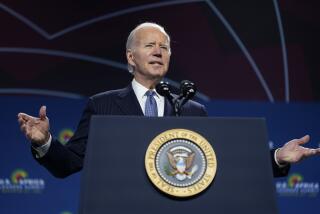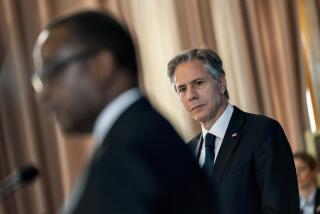Clinton Lauds Senegalese Training in Peacekeeping
- Share via
THIES, Senegal — A week after admitting that the United States and the rest of the world responded too slowly to the 1994 genocide in Rwanda, President Clinton on Wednesday urged more African nations to undergo training by the U.S. military to enhance their peacekeeping skills.
“Amid chaos and ruin, these soldiers and others like them can bring security, hope and a future,” Clinton said to an audience that included scores of U.S.-trained Senegalese troops. “I thank Senegalese troops for their commitment to peace, and I thank American troops for their work here.”
Clinton made the comments at Thies military base, a dusty, scorching compound 50 miles east of Dakar, the capital. More than 1,000 troops here have undergone 70 days of U.S. peacekeeping training, which, among other things, helps them learn to coordinate efforts with other nations.
National Security Advisor Samuel R. “Sandy” Berger said the program was conceived in “direct response to Rwanda” and the “frustration” that the Clinton administration felt because of the failure of the world community to prevent the massacre of an estimated 800,000 people there in only a few months.
The focus on peacekeeping and crisis response came on the first day of the president’s two days in the former French colony, which will complete his unprecedented 12-day tour of Africa.
As Clinton traveled through Dakar in a motorcade, he was met by tens of thousands of enthusiastic Senegalese--many wearing colorful, flowing clothes. They lined the streets for miles to get a glimpse of him. He was greeted with drum music, songs, at least one dancer on stilts and chants of “Sopi! [Change!]” from members of an opposition party.
In some places, the crowd pushed so close to Clinton’s limousine that people actually touched it as it drove slowly past. White House Press Secretary Mike McCurry said the president was both “surprised and very delighted” by the size and spirit of the crowds.
The president and his entourage boarded eight helicopters and flew to the sandy, hot military base, where Marine One, the presidential helicopter, landed in a huge cloud of dust.
There, Clinton watched a demonstration in which a Senegalese soldier inspected a suspicious vehicle and its driver. This scrutiny, a U.S. soldier explained to the president, differed from many such stops on this continent, as the Senegalese soldier was treating the suspect “with respect.”
Clinton and Senegalese President Abdou Diouf were briefed by both a Senegalese and a U.S. officer on their hopes for the joint training.
Maj. Adrian Erckenbrack, the American, said he thought this mission was improving the reputation of U.S. troops on the continent because they let regional observers watch the training “to establish trust that--for whatever reason--may not have been there.”
Senegal is one of six countries to agree to participate in the training that the administration launched two years ago. Clinton’s goal is to give Africans the skills and resources they need so that they can tackle the crises that confront them, and the administration is eager to recruit more nations, especially South Africa.
Administration officials were encouraged to hear South African President Nelson Mandela suggest that he will consider participating. In a news conference with Clinton last week, Mandela said his only reservation was his concern about putting his troops under a commander who was not an African. But the administration stressed that U.S. command had never been envisioned for an African peacekeeping force.
Troops in Senegal, Uganda and Malawi underwent training in 1997; Mali joined in February. Forces in Ghana and Ethiopia have signed up for programs to start this year.
Earlier Wednesday, Clinton met with Diouf at the presidential palace, where the American leader observed: “I think there’s an enormous sense, according to African leaders, that if they have the infrastructure and the training to do it, they can solve a lot of their own problems. I’m very excited about it.”
En route to Senegal, Clinton telephoned French President Jacques Chirac to consult with him about any suggestions he might have on what U.S. officials should discuss in Dakar. Chirac told Clinton that he was pleased with the trip and suggested that Africa might be a good topic for the meeting of the leaders of the eight major industrial nations in Birmingham, England, in May.
More to Read
Sign up for Essential California
The most important California stories and recommendations in your inbox every morning.
You may occasionally receive promotional content from the Los Angeles Times.













